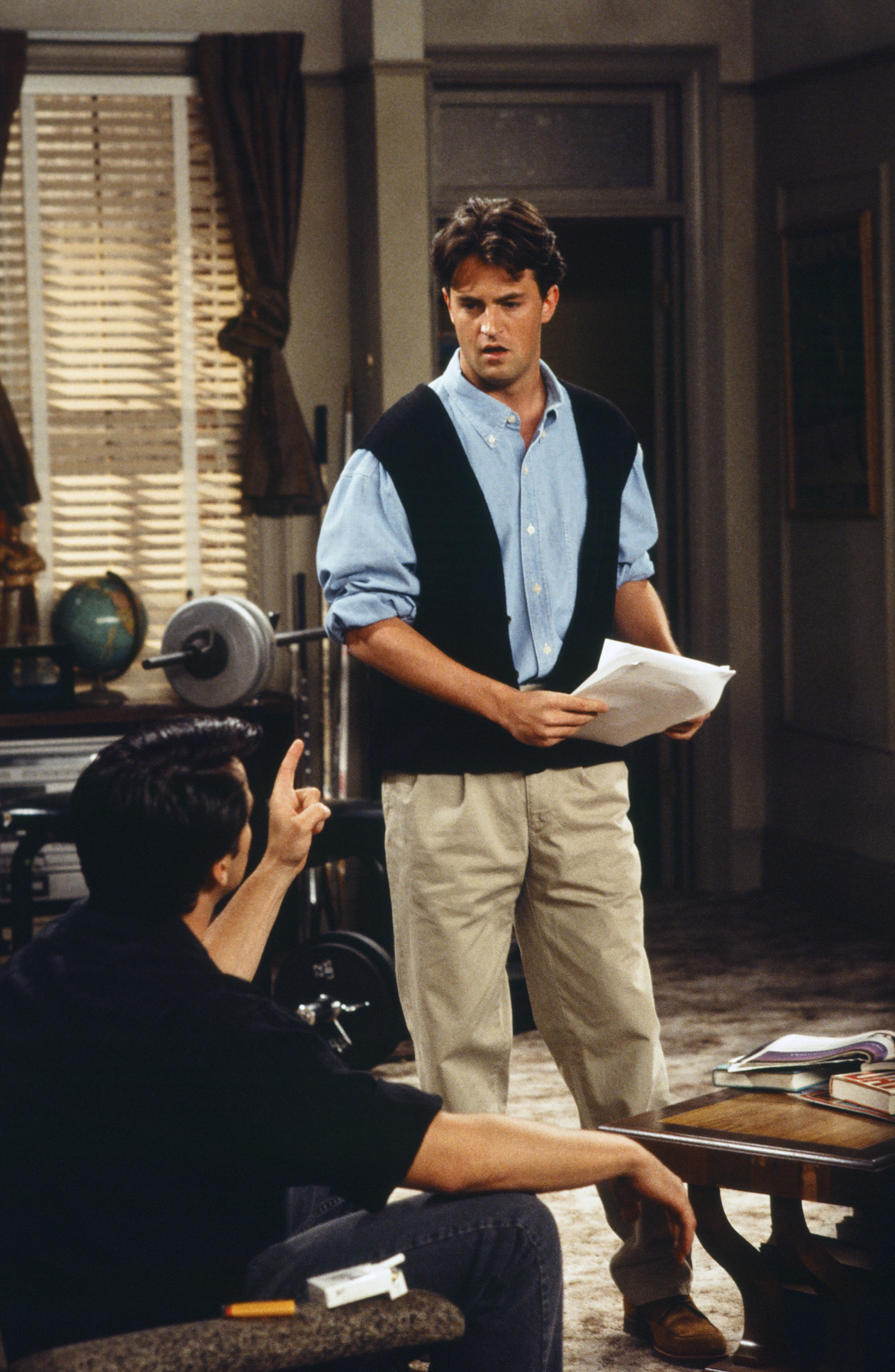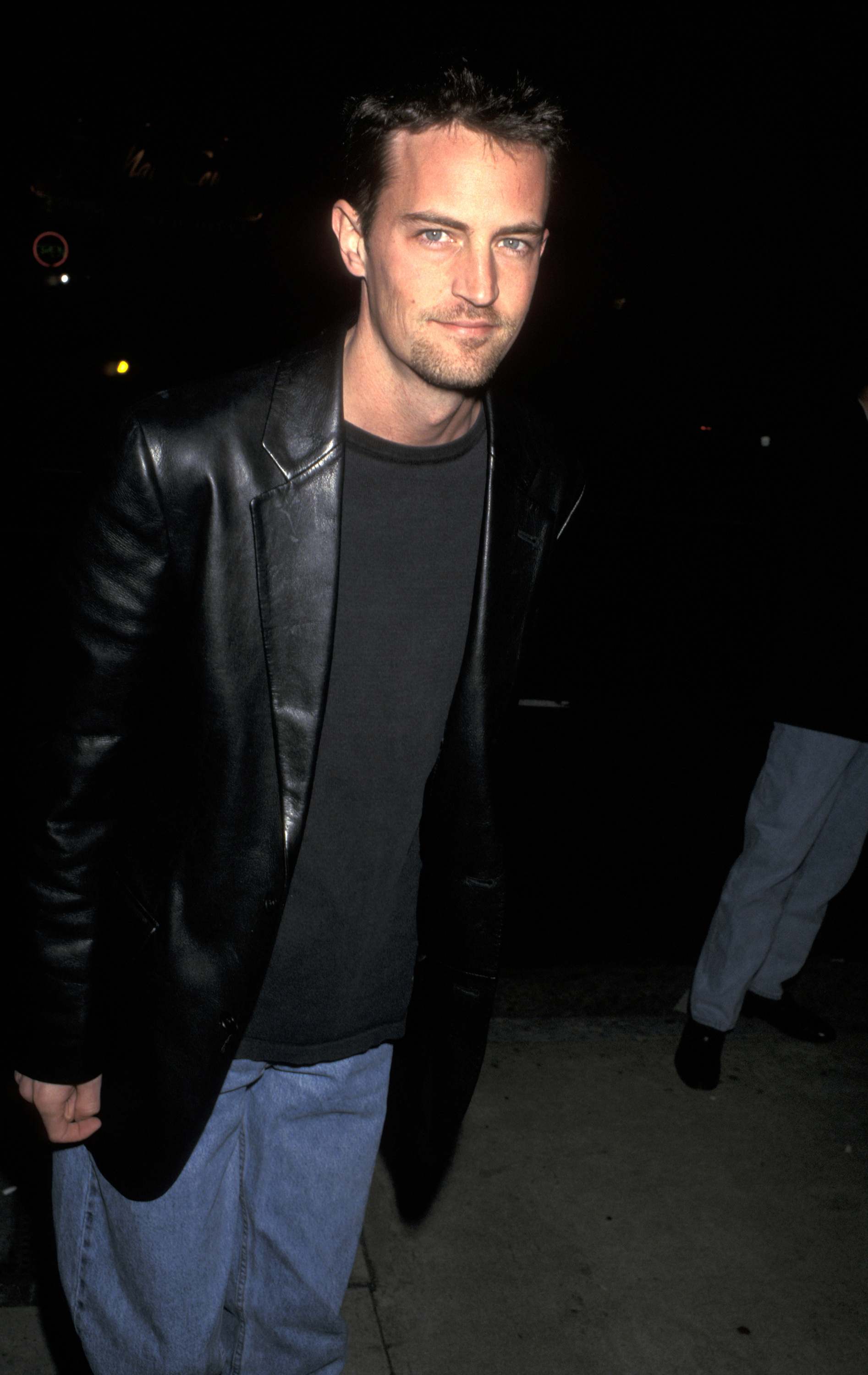Known for his iconic role as Chandler Bing on NBC’s “Friends,” Matthew Perry was a beloved television star. Beyond his time on “Friends,” he appeared in “Ally McBeal,” and earned Emmy nominations for his work on “The West Wing” and “The Ron Clark Story.”

Matt LeBlanc and Matthew Perry on the set of “Friends,” 1994 | Source: Getty Images
Despite his successful career, Perry faced significant personal challenges, including struggles with depression and addiction, and he was open about these issues throughout his life.
Perry detailed how these struggles began in his memoir, “Friends, Lovers, and the Big Terrible Thing,” and how they nearly took his life on multiple occasions.
During an October 2022 interview with ABC, Perry spoke openly about his battle with addiction. “Your disease is just outside just doing one-arm push-ups, just waiting, just waiting for you, just waiting to get you alone, because alone, you lose to the disease,” he said, describing the relentless nature of his addiction.
By that time, Perry had attended 6,000 AA meetings, spent three decades in therapy, had been to at least 15 rehabs, and lived half his life in treatment or sober living facilities.
He also disclosed that he had undergone detox at least 65 times and survived 14 surgeries following a near-fatal medical emergency years earlier. He recounted a terrifying experience where his colon ruptured, requiring emergency surgery.
“I was put on an ECMO [extracorporeal membrane oxygenation] machine. An ECMO machine, when you talk to any doctor, is a Hail Mary. It’s the last thing that you do before people die, and there were five people that night that were put on an ECMO machine and I was the only one who survived,” Perry shared.
His downward spiral began in 2000, at the height of his fame while starring in “Friends.” During this time, he isolated himself for months and turned to drug dealers.

Jennifer Aniston, Courteney Cox and Matthew Perry on the set of “Friends,” 2000 | Source: Getty Images
Perry started using prescription drugs after suffering an injury during the filming of “Fools Rush In,” a film he starred in alongside Salma Hayek. This quickly escalated, with 40 additional Vicodin pills being delivered to his home.
Believing he could manage his drinking by taking pills, Perry’s dependency deepened, leading to an addiction where he consumed roughly 12 pills a day.

Matthew Perry during “D Girl” Opening Night on April 4, 1997 in Culver City, California. | Source: Getty Images
Eventually, the celebrity attempted to quit cold turkey, but his body had built such a tolerance that he needed even more pills to cope with withdrawal symptoms.
His addiction worsened, leading him to consume 55 Vicodin pills daily. When asked how he reached that point, Perry explained that without the pills, he feared that he would become severely ill.
The actor, who starred in “17 Again” with Zac Efron, even resorted to seeing multiple doctors and faking migraines to obtain more pills. He also admitted to attending open houses on Sundays to steal any medication he could find.
Although Perry claimed to be in a good place during his 2022 interview, his life tragically ended in 2023 in what was believed to be an apparent drowning.
Perry’s tragic passing unfolded on the morning of October 28, 2023. He had engaged in some physical activity earlier that day, playing a two-hour round of pickleball before returning to his Los Angeles area home.
Upon arriving home in the morning, Perry sent his assistant out on an errand. Approximately two hours later, when the assistant returned, he discovered the star unresponsive and immediately called 911.
First responders were dispatched to the scene following a report of cardiac arrest. Law enforcement sources indicated that Perry was found in the jacuzzi at his home, where he appeared to have drowned.
No drugs were found at the scene, and the police report confirmed that there was no foul play involved. At the time, it was unclear if the activities Perry engaged in before his death had any connection to the cause of his passing.
However, two months after his death, an investigation revealed what may have contributed to his demise. The Los Angeles Police Department publicly disclosed the autopsy report in May 2024.
On December 15, 2023, the autopsy revealed that Perry’s cause of death was due to the “acute effects of ketamine,” the LAPD shared on X.
According to the autopsy report from the Los Angeles County Coroner, the movie star had reportedly been clean for 19 months before his death. The report also revealed that Perry had been undergoing ketamine infusion therapy, with his last treatment taking place “one and a half weeks before” his passing.
However, the coroner clarified that “the ketamine in his system at death could not be from that infusion therapy, since ketamine’s half-life is 3 to 4 hours or less.”
Ketamine, described by the U.S. Drug Enforcement Administration as a “dissociative anesthetic with hallucinogenic effects,” can “distort perception of sight and sound, create a sense of disconnection, and induce sedation, immobility, pain relief, and amnesia.”
The autopsy concluded that Perry died from the acute effects of the drug. Additional contributing factors include drowning, coronary artery disease, and the effects of buprenorphine, a medication used to treat opioid use disorder. His death was then ruled as accidental.
The coroner’s report also noted that he died through an “unknown route of drug intake.” Although prescription medications and loose pills were found in Perry’s home, the autopsy stated that there were “none reported near the pool,” and no drugs were “found adjacent to the pool.”
Following these findings from the Medical Examiner, the LAPD, in collaboration with the DEA and the U.S. Postal Inspection Service, intensified its investigation into the circumstances surrounding Perry’s passing.
The inquiry into the Los Angeles native’s death took a significant turn when authorities eventually uncovered evidence of foul play. This discovery led to significant developments in the case, culminating in the arrest of several suspects on August 15, 2024.
The U.S. Attorney’s Office announced the arrest of a licensed doctor and an alleged drug dealer from San Fernando Valley in connection with Perry’s death. A total of five individuals, including two doctors, face charges related to distributing ketamine to the actor in the weeks leading up to his passing.
Jasveen Sangha, known as “The Ketamine Queen,” and Dr. Salvador Plasencia, nicknamed “Dr. P,” are among those charged. Sangha has been accused of supplying the ketamine that caused Perry’s death and faces multiple charges, including conspiracy and drug distribution.
Meanwhile, Plasencia faces charges of distributing ketamine and tampering with evidence. Three additional individuals have also been charged in connection with Perry’s death.
Erik Fleming, 54, pleaded guilty to supplying the ketamine that caused the celebrity’s demise and admitted to delivering 50 vials to Perry’s assistant, Kenneth Iwamasa, just days before the actor’s passing.
Iwamasa, 59, also pleaded guilty, confessing to injecting Perry with ketamine multiple times, including on the day he died. Dr. Mark Chavez, 54, from San Diego, agreed to plead guilty, admitting he sold ketamine to Dr. Salvador Plasencia and obtained additional supplies through fraudulent means.
Dr. Plasencia frequently injected Perry with large doses of ketamine, even administering the drug at the star’s home. Court documents reveal that Plasencia, in a text message to Dr. Mark Chavez, called Perry names. The messages read, “I wonder how much this moron will pay,” and “Let’s [sic] find out.”
Plasencia faces multiple charges, including conspiracy to distribute ketamine, distribution of ketamine resulting in death, possession with intent to distribute methamphetamine, and falsifying records in a federal investigation. He has pleaded not guilty to all charges.
Authorities emphasize that these defendants prioritized profit over Perry’s well-being, contributing to his tragic death. The case highlights the commitment of law enforcement to hold those who distribute dangerous drugs accountable.
Yet despite the severity of the allegations, both Plasencia and Chavez still hold active medical licenses and can continue prescribing medications.
The California State Medical Board reportedly initiated an investigation into both doctors but has not taken any disciplinary action, leaving their licenses unrestricted.
The Board issued a statement confirming that “both licenses are current and active and the Board has not imposed any restrictions on them.”
Notably, Perry resided in a secluded Beverly Hills home with his longtime Japanese assistant, Iwamasa, until just a few weeks before his untimely death.
The showbiz star had been renting the three-bedroom hillside property, which offered stunning views of Beverly Hills and the ocean, for $49,000 per month while his $6 million Pacific Palisades home was being renovated.
Iwamasa, who according to his LinkedIn profile, had been managing Perry’s affairs for over 25 years, lived with the actor in the rental home.
